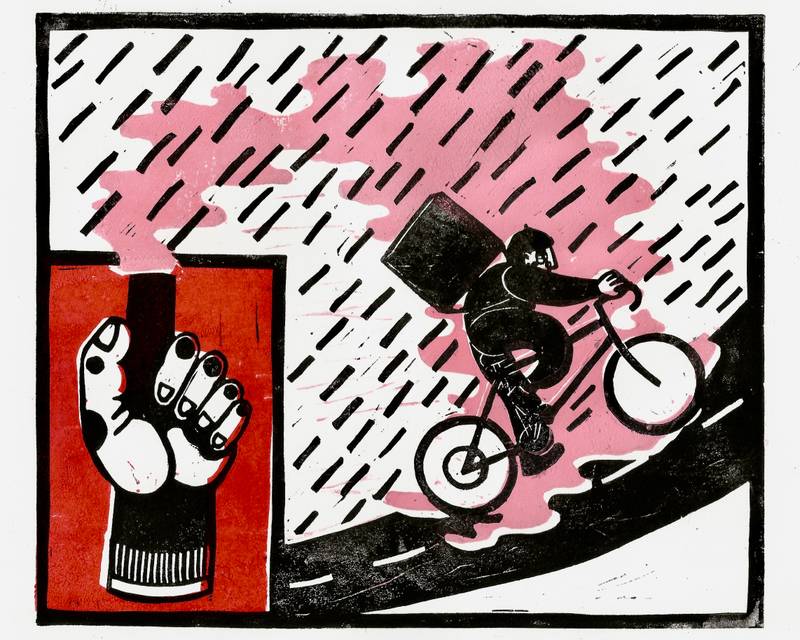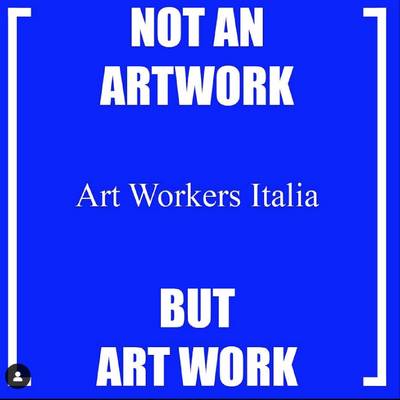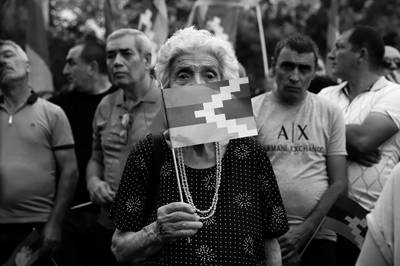

Illustration by Naomi Scott
Rohan Stevenson is a Marie Skłodowska-Curie Actions funded doctoral researcher at the Centre for European Studies, University of Helsinki. His research examines how ‘right-wing extremism’ is problematised in European counterterrorism policies.
waiting
it’s friday evening and i’m sitting on a concrete bollard in the corner of fountain park. the wind pushes a pizza box past my perch and a ripped bin bag flaps from a railing. i’m a deliveroo rider; waiting in the sweet spot between nando’s, five guys and burger king for the algorithmic gods to bless me with an order. i check my phone for the seventh time but the home screen’s empty.
a good deliveroo shift goes something like this. sunny and windless day, order comes in instantly, ready when you arrive, not too heavy, leisurely pedal across the meadows, ground floor flat, quick response on the buzzer, smile from the customer, £3 tip, repeat. that’s a lot of variable factors and it won’t come as a surprise that the planets in the deliverooniverse aren’t always so perfectly aligned. any of the above can be substituted with high winds, black ice, delays in the kitchen, leaky packaging, broken buzzers, rude customers, no tips and, increasingly, no orders.
it’s looking like the latter will be the case this evening. there are about six of us in our silver and green jackets and snail-shell delivery boxes, sitting astride bicycles or pacing about to keep warm. a pair of riders are discussing the merits of tubeless tyres, another is speaking animated portuguese into a headset and the rest of us are on our phones. i’d like to chat but i’m feeling shy.
waiting can undermine the possibility of self-care…by making people wait for essential needs1. rather than an hourly wage, deliveroo uses a fee-per-delivery system which means that no orders = no earnings. this works out fine when it’s busy, but they also have a strategy of recruiting large numbers of workers to reduce labour costs2 which means that, most of the time, there’s simply too many riders and not enough work. this business model has created the situation the six of us find ourselves in; waiting in one of edinburgh’s less picturesque but more restaurant-dense locations for the opportunity to earn under a fiver. acts of waiting are temporal processes in and through which political subordination is reproduced, with subjects waiting hopefully and then frustratedly for others to make decisions, and in effect surrendering to the authority of others3. in this case, that ‘other’ is the deliveroo algorithm.
the rider sitting closest to me - a strapping bloke in shorts and thermal leggings - looks up from his phone to ask for a lighter and we get chatting about the algorithm. he reckons it punishes you for rejecting orders by subsequently assigning you fewer and while i’m not so sure, the truth is that neither of us have the foggiest. the deliveroo algorithm is an example of a ‘black box’ system4: it collects vast amounts of data from riders’ phones, whilst keeping the details of its own internal operations a secret. to scrutinise others while avoiding scrutiny oneself is one of the most important forms of power5.
my new friend receives a ding on his phone and jogs inside to pick up an order. on his way out, he asks for my number, explaining that there are plans for a strike action like the ones down in london, if i’m interested. it’s been suggested that chronic waiting may be the soil in which political projects blossom6 and it’s true that, if it weren’t for waiting, this interaction would never have happened. the sociologist siegfried kracauer7 suggested that one’s waiting is a hesitant openness and a tense preparedness for action. half an hour ago - scrolling instagram and shivering atop a bollard - i might not have agreed. but after this chat, i’m beginning to believe there might be something in that.
not long after, there’s a ding in my pocket too. ‘you’ve been assigned an order for delivery!’ announces the app; pickup from nando’s, £4.10 delivery fee. i hop onto my stiff legs and head over to the double doors, feeling encouraged.
teetering
i enjoy (up to a point) the physical challenge of cycling through the city, and there’s excitement and exhilaration to be taken from jumping red lights and narrowly avoiding bin lorries. of course, my reaction to this danger would be quite different if i had family commitments, in which case i would know that my being affected would spread beyond the limits of my own body to those who depend on me. this is, of course, the reality for many deliveroo riders; in which case, making a living from one’s bike is probably more anxiety-inducing than exhilarating.
5 deliveries later, i’m racing down lothian road, weaving in and out of traffic. the lights at brewdog turn red just before i reach them, but i know that, with enough speed, i can still get across the junction. the cold air brings tears to my eyes as i slice through it, and i only just make it before the vehicles to my left are released like horses from a starting gate. there’s a bin lorry in pole position; and the driver leans out the window to shout something unintelligible as it passes. my momentum gets me up the hill, and i hop onto the curb by the caledonian to avoid the one-way system. checking shandwick place for buses and trams, i cut across both its lanes to the top of queensferry street and arrive at the site of my next pickup - zizzi - with a thumping heart, pulling air deep into my lungs.
a friend of mine and choreographer used his experience working for deliveroo as inspiration for a dance performance entitled liquid labour8. whilst exploring the stresses of working in the gig economy, it also emphasised the thrill and pleasure of making one’s living from one’s bicycle. i thought this was a fitting medium because the job has always felt to me like something of a dance. there’s a choreography to the pickups and dropoffs; prop bike, bag off, unzip, in; grab food, out; load bag, zip up, bag on, go. it’s a routine that, by now, is logged in my muscle memory and often puts me in a flow state.
the cyclist’s performance is…every bit as physically intense and emotionally charged as that of a dancer or other performer on a conventional stage 9. as a cyclist, one is often exposed to climatic extremes and the risk of injury or even death, and that exposure sparks an intense emotional response. i enjoy (up to a point) the physical challenge of cycling through the city, and there’s excitement and exhilaration to be taken from jumping red lights and narrowly avoiding bin lorries. of course, my reaction to this danger would be quite different if i had family commitments, in which case i would know that my being affected would spread beyond the limits of my own body to those who depend on me. this is, of course, the reality for many deliveroo riders; in which case, making a living from one’s bike is probably more anxiety-inducing than exhilarating.
the wind has picked up when i exit the restaurant, and as i make my way onto princes street, it tries to buffet me into the traffic. with south charlotte street to my left, i move into the tram lane and have to keep glancing down to avoid getting my wheels stuck in the tracks. with no cycle lane, i must either balance in the foot-wide gap between tram track and curb or cut across into the middle of the lane, holding up the buses. approaching the next set of lights, i’m sandwiched between a national express coach, a taxi and a 4 x 4. i can taste the exhaust fumes.
riding for deliveroo is a precarious job; both as a physical activity and a work arrangement. bourdieu9 defined precariousness as a new mode of domination in public life… based on the creation of a generalized and permanent state of insecurity aimed at forcing workers into submission, into the acceptance of exploitation. as a courier, this state of insecurity is embodied in the act of cycling - teetering over tram tracks and treading gingerly along icy paths - and compounded by the lack of insurance for accidents and bike theft. in fact, the piece-rate wage system actually incentivises the taking of risks to cut delivery times. there’s a reason for the precarity of course; it creates a more flexible and mobile workforce. as my choreographer friend put it, it’s the symptom of an economy where everything has to be as liquid and lean as possible11.
resisting
3 deliveries later, i’m standing in the dimly-lit hallway of a tenement off slateford road. it’s a few hours into the shift and my back’s aching from pedaling against 40mph gusts of wind. a kid with an excitable dog opens the door and hands me his phone, through which his older brother - the
customer aggressively informs me that he accidentally put in his parent’s address and that i need to take the order to his. he messaged me through the app apparently but, with no signal in the building, i can’t see it. using the younger brother’s phone, i type the address into google maps - it’s two and a half miles away.
i feel uneasy as i return to my bike; images of being pursued by hungry men flashing through my mind. i feel guilty too; it was an honest mistake and, despite his aggressivity, i know we’re in the same boat - both trying to navigate this frustrating app and meet our needs. it’s a central contradiction of platform capitalism that, whilst the worker is required to be as flexible as possible, the platform itself has almost no capacity for flexibility at all.
i tell him that i’m getting paid £3.29 for this delivery, and won’t get any more to fix his mistake. he says he’ll pay me extra, but his aggressive tone has put me on the defensive and i don’t feel like trusting him. you’re supposed to call the rider support helpline in these situations, but it’s a ten-minute wait to get through and in that time i could have picked up another order. the dog is losing it and has its paws all over me, i’m exhausted and i have no idea what to do. so i say ‘sorry mate’, leave the food on the doormat and exit the building. as i step out the door, i hear the brother helplessly say: ‘he’s just left it here…’.
i feel uneasy as i return to my bike; images of being pursued by hungry men flashing through my mind. i feel guilty too; it was an honest mistake and, despite his aggressivity, i know we’re in the same boat - both trying to navigate this frustrating app and meet our needs. it’s a central contradiction of platform capitalism that, whilst the worker is required to be as flexible as possible, the platform itself has almost no capacity for flexibility at all12. totally reliant on the app, we have no independent ability to coordinate the labour process or do things in the most logical way, whilst the automated management can’t make any concessions or compromises to workers. algorithmic management is authoritarian management13: the app produces a command and you just have to follow it.
such an autocratic approach is uncommon in the era of human relations management (hrm)14. hrm entails companies attempting to generate commitment, as opposed to outright compulsion, in their workers, through participative structures and employee involvement policies. whether deliveroo is even attempting such an approach is questionable, but either way, it is unsuccessful. the ‘black box’ nature of the labour process undermines the potential for workers to have any buy-in or pride in the work15. in fact, by preventing the possibility of any relationship between managers and the workforce, it renders any feeling of commitment almost impossible.
the wind has dropped as i push my bike back onto the main road, but i decide it’s time to call it a night. leaning my bike against a lamppost, i sit on the window ledge of a boarded-up bookie to have a last cigarette before cycling home. the daylight is starting to melt, and the air feels warmer. an electronic billboard outside lidl is already announcing prince philip’s death; a reminder that some lives are worth more than others.
my phone dings again, notifying me of a message from the bloke i met earlier:
hey pal. here’s a link to the union i’m part of. they’re lacking an edinburgh branch atm, but i could be up for getting the ball rolling if you’re motivated.
i follow the link and it takes me to the website of the independent workers union of great britain. the home page has a picture from the strike in london; pink smoke from flares surrounding a courier with a megaphone, wearing his delivery box. next to him, another holds a banner reading WE DODGE DEATH TO MEET YOUR DEADLINES. with a little rush of what feels like empowered indignation, i click the button that says JOIN.







